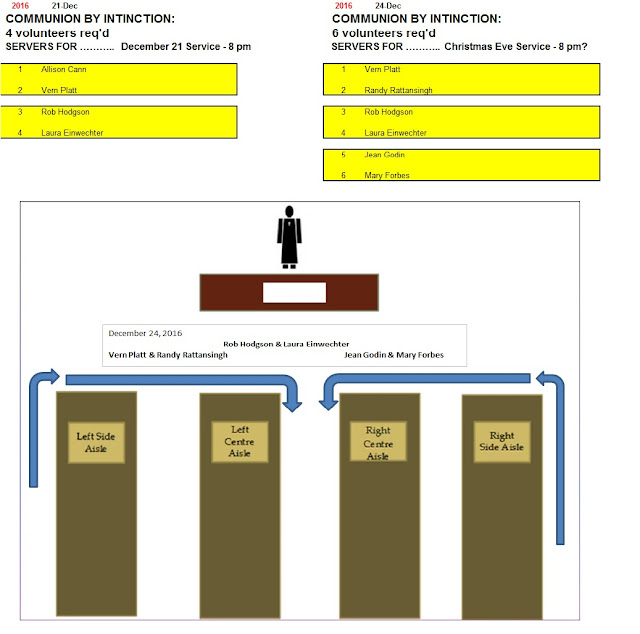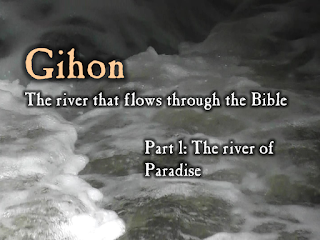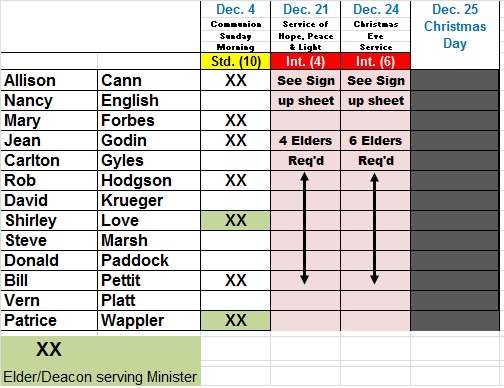Gihon: The River of Paradise
Hespeler, 6 November, 2016 © Scott McAndless
Genesis 2:8-17, John 5:1-9, Psalm 46
| T |
he second chapter of the Book of Genesis describes a garden – a place of idyllic existence where, the Bible says, humanity first came into being. This garden was perfect – the only place where all life (human and animal alike) lived together in peace and harmony. But the story goes on from there to tell us that the garden was lost and that humanity will never be able to enter it again as long as this world exists.
The loss of the garden has been a powerful idea that has possessed many people down through the ages who have sought for a way to get back to it. Some have sought to do it by questing after the tree of knowledge of good and evil – seeking to reclaim the garden by expanding human understanding. But they have not got us there yet by that route and sometimes have led us far astray.
But what if we could find it in another way – what if it were a place on the map? I mean not a literal location that you could just punch into your GPS and drive to, but what if the geographical description in Genesis was meant to point us to a metaphorical place where we can find it in this world. The garden is said to be in a very particular (if unusual) place: “A river flows out of Eden to water the garden,” it says, “and from there it divides and becomes four branches.” The four branches are given names, some of which seem familiar. They are, Pishon, Gihon, Tigris and Euphrates.
Now, half of those rivers are immediately recognizable. Tigris and Euphrates are the two great rivers that flow through the land of Mesopotamia, which means the land between the two rivers. They flow today through the country of Iraq and they mark the place where archeologists tell us that human civilization first came into being at a place called Sumer.
The other two rivers are harder to recognize. Since half of the rivers would have been well known to the people who first heard this story, the assumption is that the other half would have been as well. The first river called Pishon – a name totally unknown otherwise – and we’re told that it flows in a land called Havilah which is also unknown. But then it says that, in the place the Pishon flows, there is gold, bdellium and onyx stone. Since bdellium (a precious resin) is only found in sub-Saharan Africa and onyx was a precious stone commonly used in Ancient Egypt, some have suggest that Pishon must be another name for the River Nile which starts its course in sub-Saharan Africa and flows through the rich valleys of Egypt. The Nile would fit well in the company of the Tigris and the Euphrates as Egypt was the second great civilization of the ancient world.
In fact, when you think about it that way, it suggests a very powerful symbolic meaning for this description of the Garden of Eden. The passage states that, out of the original garden and the things that happened there, there flowed the three of the great rivers of the ancient world – Tigris, Euphrates and Nile. And these three rivers were the cradle of human civilization itself in Mesopotamia and Egypt. This suggests to me that maybe the story of the garden was not intended to explain the origin of the human species so much as it was intended to explain the origin of human civilization.
Think of the symbolism of the story of Eden. The humans are expelled from the garden, an idyllic rural existence, by their choice to pursue the tree of knowledge. Civilization is marked by the quest for knowledge and calls on people to move from a rural lifestyle into the city.
Civilization has brought so many blessings, of course, but that relentless search for knowledge has also created many problems (nuclear proliferation and climate change are two that come to mind) that may destroy us in the long run. In many ways the loss of the garden, that loss of connection with the land has also been very costly. These three rivers may give us an angle on the story of the Garden of Eden that can help us to explore those very issues which are still important today as we still search for the garden that we have lost.
But that brings us to the fourth river, the Gihon. It has long proven the hardest to identify. There has been a lot of speculation about the identity of the Gihon down through the centuries. Some have also associated it with the Nile River (or a branch of the Nile) as well because it is said to have flowed through the land of Cush and Cush is an ancient name for the land that we call Ethiopia. But there is another possibility that comes from the name of the river itself. The name comes from a Hebrew root that means “to burst forth,” which doesn’t sound like a good name for a river so much as for a spring which might be the source of a river.
And it just so happens that there was a spring that fed a river that was called Gihon – a spring that was very well known to the people who first heard this story in the Book of Genesis. It was a small spring that flowed from a spot very close to a mountain called Zion. This spring was extremely important to the ancient Israelites because it made that mountain into a good and defensible spot where you might build a fortress and a city. The city that they built there was called Jerusalem, the city of David and his capital.
The spring mattered because a decent water supply was so hard to come by in that part of the world. It made it possible, for example, for the city of Jerusalem to withstand many attacks and sieges over the centuries, something that is celebrated in the Psalm we read this morning (which was likely written as a national celebration when the city had survived an attack): “There is a river whose streams make glad the city of God, the holy habitation of the Most High. God is in the midst of the city; it shall not be moved.” The river celebrated in that Psalm is none other than the Gihon and it describes the river as a sign of the presence of God in the city.
Now, traditionally, interpreters have hesitated to identify the river Gihon that is said to flow from Eden in Genesis with the Gihon that flowed in the city of Jerusalem. In fact, I cannot find any commentary that even suggests that they are intended to be the same river. You can probably guess why. People have had a hard time seeing how this tiny stream in Jerusalem belongs in the same league as mighty and historically significant rivers like Nile, Tigris and Euphrates. Jerusalem, as a centre of civilization, is also hard to compare with the much larger ancient cities of Mesopotamia and the Nile valley. If the Gihon is just a small stream in Jerusalem, it doesn’t seem to belong in the company of the other rivers of Eden.
But here is the thing: the description of the rivers of Eden never really made sense geographically speaking. Rivers simply do not work like they are described in this passage – especially with several rivers dividing off from one original river and then somehow flowing to various far-flung corners of the world. But that is okay because I don’t think that this description was ever meant to be taken as pointing to a literal geographical location.
The people who first heard and repeated this story did not hear it as a story about something that happened a long time ago in a remote geographical location. It was a story that was part of their daily lives and, if they could look over and see a stream, flowing by the streets of Jerusalem, and recognize that stream as a river that once flowed from Eden, that would have said some significant things to them about the world that God created and their place in it.
For one thing, it gave them a sense that they had a place among the great nations and empires of the earth. They looked at the great powers of the world such as Babylon (which lay between the Tigris and the Euphrates) and Egypt along the Nile and they could say, “Yeah, but look at us! We’ve got a river of Eden that flows through our city too. We too are one of the world’s great civilizations.” It was a matter of national pride and identity.
But the connection between the Gihon River that they knew and the Gihon River of Eden was about more than that. They saw it as a point of connection between their daily lives and the ideal world promised in the original story of the garden.
Here is the thing that I have noticed. The Gihon River of Jerusalem is rarely named in the Bible but there are many passages and stories about this river. The river flows right through the whole Bible though you may have never noticed it. In fact, the very last chapter of the Book of Revelations – of the whole Bible – includes a description of a river that flows from the throne of God in the new heavenly city of Jerusalem – a new Gihon. It is the final comforting image of the Bible. Isn’t it interesting to think that the Bible both begins and ends on the banks of the River Gihon?
In our reading from the Gospel of John this morning, we find ourselves at the Pool of Beth-zatha – a pool in Jerusalem that was fed, in the time of Jesus, by the spring of the River Gihon. In this story we learn that, by the time of Jesus, the people of Jerusalem had come to believe that the waters of that stream had healing and restorative powers when the spring burst forth and stirred the water. Did they come to that belief because somewhere in their ancient traditions they connected this stream in Jerusalem to the ancient waters of Eden and the wholeness that humanity had known there? Did they believe that those waters had a healing power because of that connection?
Of course, maybe that doesn’t matter because in the story in the Gospel of John, the Gihon waters prove unnecessary and Jesus himself is able to heal the invalid. Perhaps that tells us that Jesus himself is a stronger connection to the wholeness of Eden than any stream could be.
I don’t know if Eden in the Book of Genesis was ever intended to be understood as a literal place that once existed. I don’t know if the events that we are told took place there were meant to be taken literally or symbolically. But I do know this: the story of Eden is true because it tells me so much about what it means to be human in this world. One thing it speaks to me about is that sense of what we have lost as humans on this planet. I believe that we should be able to live together in peace and harmony. I believe that there is no good reason why everyone in this world should not have enough to get by. I know that war and all of the destruction it brings shouldn’t happen – it doesn’t make sense. And there is this disconnect between how I think the world should be and how it actually is. I long for Eden – that perfect picture of what it should be – and I do not find it. I’ve never seen the garden and yet I miss it.
Traditionally, Christians have thought of Eden as totally cut off from the present world. It is a garden found in the remote past at the beginning of the world or in a remote future (a garden restored) at the end. But I am beginning to suspect that the Israelites didn’t see it that way. They walked through the streets of Jerusalem and saw, right there, a stream that was, for them, a river of Eden. The garden wasn’t remote for them, it was right there.
What might change, do you think, if we began to think in the same way? What if we could look out the door here, at the Speed River that flows just over there, and see it as a river of Eden. It might give us some hope that the dysfunction of this world isn’t fated to be, that Eden is just over there.
What if every river is a river of Eden? What if we all could find our way there by following them back? It is an intriguing idea and one that I hope to continue to explore as we continue this journey to the biblical Gihon next Sunday.
#140CharacterSermon Gihon River means #Paradise isn’t remote in time or place. It is near if we choose to believe in #peace & understanding.
A Very Special Remembrance Sunday
On Sunday, November 6, St. Andrew's Hespeler will be celebrating Remembrance Sunday. This service will include prayers for peace among the nations and a celebration of the commitment, service and personal sacrifice of those who have served our country in times of great need. We will observe two minutes of silence, highlight those members of the congregation who have served in the military and celebrate our nation with the singing of the national anthem.
Oh, and one more thing. We are certainly eager for you to join us Sunday and to bring your friends too, but you don't necessarily need to show up a whole hour early so....
Continue reading »
There are number of other things that will make this service meaningful and memorable:
- The Youth Band will be performing a medley of Peace Like a River and Kum Ba Yah
- The choir and music director have prepared music based on the themes of peace and of rivers.
- The minister will present the first of a two-part sermon on the River Gihon in the Bible. Here is a short introduction to the series.
Oh, and one more thing. We are certainly eager for you to join us Sunday and to bring your friends too, but you don't necessarily need to show up a whole hour early so....
161st Anniversary Service
This Sunday, October 30, the congregation of St. Andrew's Hespeler will gather to celebrate our 161st Anniversary. There will be many things to make this gathering special:
Continue reading »
- Our very special anniversary preacher will be the Rev. Linda Ashfield. Linda is minister at Knox Waterloo Presbyterian Church where she is in a team ministry together with her husband, Brooke. In fact, Brooke and Linda have the distinction of being the first couple in the Presbyterian Church in Canada to be ordained together.Linda has a ministry that inspires and instructs many. Over the years, Linda served the church on the Board of Ministry, Board of Congregational Life and the Board of World Mission. She helped create Youth in Mission and worked as YIM’s National Co-ordinator. Linda was the Canadian National Co-ordinator for the Presbyterian Church in Canada for Youth Triennium (86), working on the Design Team and organizing the Canadian delegation as well as Internationals from 12 countries. In 1992 she was the Canadian preacher at Triennium. She gave leadership at four Youth Trienniums held at Purdue University as well as four Canada Youth events, preaching the closing service at Canada Youth 2012. We look forward to what Linda has to share with us as she preaches about "What's essential?"
- Our special Musical Guest will be Dan Amorim, a talented and gifted organist. His presence with us will enhance our worship in too many ways to count!
- Our own musical groups will be putting out their very best for us. That includes our Senior Choir, Youth Choir, Youth Band and Joyful Sound (Men's Chorus).
- Following worship our fellowship time will include a tasting of meat pies from our fundraiser.
- Fellowship time will also include the dramatic conclusion of our exciting pie in the face contest! Would anyone like to know what it takes to get the honour of throwing a pie in the minister's face?
Christmas Wish Auction!
Please mark your calendars!
Saturday, November 26, 2016
Viewing, coffee/tea/desserts at 7:00 pm
Live Auction to begin at 7:30 pm.
If you have any items you would like to donate to the auction please contact Joni Smith, [email protected]
Suggested items, but not limited to, might be: a painting (we know there are a few very talented artists in our midst), a service that you could provide (we have a donation of 3 separate lawn aerations with a $40 value for each one), any item that you have handcrafted (we have a beautiful quilted wall hanging and warm winter sweaters donated). Be creative, have fun!
Laughter
Hespeler, 23 October, 2016 © Scott McAndless – Baptism
Genesis 18:1-15; 21:1-7, Psalm 126, Luke 6:20-21
I |
f you are going to understand the two stories that we read from the Book of Genesis this morning, you need to learn the meaning of one Hebrew word. If you do not know this word, you totally miss the point of both of the stories. The word is yitschaq and it is the Hebrew word for laughing. It has been suggested that it might be an onomatopoetic word – that is, a word that sounds like the thing that it describes (you know, like the word quack sounds like the noise a duck makes and the word bark, like the noise of a dog). Apparently, to an ancient Hebrew ear, laughter sounded a little bit like somebody going “yitschaq, yitschaq, yitschaq.” I guess that some ancient Hebrews just had weird laughs.
That Hebrew word is important because laughter is an important theme in both stories we read this morning. In one, Sarah laughs in her tent when she hears an angel promise her husband that she will have a child even though she is far too old to do so. She laughs because the promise is so impossible as to be ridiculous and later she denies having laughed. In the second story, when the promised child is actually born, Sarah laughs again for the absurdity of her having a child in her old age but she is also laughing for joy.
You get this kind of thing a lot in ancient books like the Bible. Ancient people really loved to tell stories about how people, places and things got their names and the punchlines of these stories were often amusing puns and wordplays. Sometimes people loved these kinds of stories so much that there would even be competing stories about where the name came from like we have here.
The really fun things about these stories is that they were usually created long after the actual naming took place and may have had little connection with what people were actually thinking at the time. Ancient people really didn’t have a clear idea of how words and names are invented. But that was fine because the stories were not really about how something got named. The stories were about deeper truths than that.
Take, for example, these two different stories about how Isaac got his name. One takes place just before the child is conceived and, in it, the laughter is there because the very idea that a woman as old as Sarah could have a child is too ridiculous. The second story takes place after the child has been born. The two stories, it seems to me, help us focus in on different aspects about what it means to bring a child into this world.
But since it is a little bit difficult for us to relate to a child named Yitschaq who was born thousands of years ago to an aged couple named Abraham and Sarah, it might be helpful to relate them to a child who we can actually see and hold and relate to. Let us think of these passages in relation to another child named Isaac born about six weeks ago. A lot of things may have changed in the world since the days of the original Yitschaq, but one thing that hasn’t changed is that, when children come into this world, they bring with them many challenges and problems, but also many blessings and a whole lot of laughter.
In the first story, Sarah, hiding in the tent and listening to God’s promise, laughs. We are told that her laughter springs from what she says to herself: “After I have grown old, and my husband is old, shall I have pleasure?” She laughs because, though she greatly desires a child and long has done so, it is just not supposed to happen at this point in her life.
Perhaps she laughs because she realizes that having a child at this point in her life would also bring with it some very particular challenges. How are you supposed to take care of a baby if you are dealing with the typical challenges of old age for example: arthritis? reduced stamina? Heart conditions? How do you deal with the long sleepless nights when you have all of that going on? How is she supposed to even feed her child if, as it says in Genesis, it has “ceased to be with Sarah after the manner of women.” Would a mother even be able to produce milk in such a state? The real challenges of parenthood are only amplified when a child arrives unexpectedly and at a time that is not considered normal according to the culture.
Well, little Isaac who we welcomed into the life of this congregation this morning, was not born to a mother well past the age of childbearing, of course. But, at the same time, he didn’t necessarily come at the usual time for a child, at least according to our modern western culture.
Older cultures had very different ideas about when the ideal time was to have children, of course, but the expectation of modern society seems to be that children should ideally enter into the picture only after the parents’ lives have settled down and they have found a certain economic stability. The modern ideal is that this is only after the mother has had time to establish herself in some career or work. I don’t really know if that modern notion is as ideal as we all seem to think it is – for one thing, it tends to mean that women delay childbearing until other problems, such as infertility, begin to be an issue – but that seems to be how we have decided that it is supposed to be done.
And, no, the arrival of Isaac doesn’t really fit that cultural ideal. That is not to suggest, for one moment that he was not wanted. There are people here who looked forward to his arrival with all the love and expectations that have been there for any child ever born. It is certainly not to suggest that he isn’t loved. But the birth of any child always brings with it certain challenges and that is all the more true when it does not come with that culturally ideal timing and circumstance. I know that Isaac’s arrival will make it more difficult, for example, for his mother to complete all of her education and to set out on a path in her life that will build her own economic security. I mean, it is hard enough for any young person today to start out and to figure out what sort of work is going to still be there for them to do and get paid for even just a few years down the road. That can be a much more difficult road to travel down with a child. The struggles of life are real and we ought not to pretend they aren’t there.
But, and this is the beautiful part, in the story, Sarah doesn’t despair in the tent, she laughs. The laughter may be nervous about possible futures and it may reflect some uncertainty about what that future holds, but it is still laughter, which is a cousin to joy. There are times to worry about and especially to prepare for an uncertain future, but at the same time, it is important to see that God doesn’t just send us those challenges alone. They come mixed with blessing and laughter and I know that so much of that has already come with Isaac and that so much more is yet to come.
God also doesn’t send challenges to us in isolation. One of the greatest blessings that God gives to us is community and, honestly, how could any of us deal with the very real challenges of raising children in the modern world without a community to fall back on. One of the things that makes this event so joyful today is the tremendous amount of support that Isaac and his mother have from their family and their friends, including three godparents (which is perhaps a record here at St. Andrews) who have joyfully and lovingly stepped forward to make their own promises to support and love Isaac and to see that he comes to know the Gospel and finds his own path to live in it. This tremendous level of support means that any challenges will be more than overcome with laughter.
On top of that, of course, is the community of this congregation. We also have stepped forward in this sacrament of baptism to promise to give to Isaac every support that we can to help him grow into a man who can someday chose for himself how he serves God and lives according to God’s will in this world. That is, as far as I am concerned, the most important aspect of our celebration of baptism today and I hope it is something that we never lose sight of. Because of our commitment and our joining together with Isaac, his mother, his family and his friends, the joy and the laughter is only magnified because we all get to join in it together.
In the Book of Genesis, Sarah’s laughter after her son has been born seems a little bit different than in the first story. “God has brought laughter for me; everyone who hears will laugh with me,” She says. “Who would ever have said to Abraham that Sarah would nurse children? Yet I have borne him a son in his old age.” This seems more of a laughter of pure joy than anything else. It still seems a bit ridiculous to her that she should have a child in this season of her life, of course, but any apprehension seems to have dissolved away into pure joy.
I do rather feel that we are much more in the frame of mind of the second story here today. I can sense the laughter, the love and joy that surrounds Isaac and his family today. Perhaps some of Sarah’s joy in the Genesis story comes because she is now more focussed on the future than on the past or the present. She looks at this little child that she cradles to her breast and sees, not the troubles and complications that will come with raising him, but the sheer potential that is in him. In the Biblical Yitschaq’s case, that potential is huge because God has promised that, in this little baby’s skin lies, not only the future of one life but of an entire nation. Sarah can already imagine the nation that Yitschaq will become and that will inherit all of the promises that God has already given to Abraham and Sarah themselves.
And potential is absolutely something that we can celebrate in little Isaac here today. I’m not necessarily expecting that he is going to grow up to found an entirely new nation. I think that age for that has passed. But just look at him. Who knows what he might grow up to do or be? He is going to live in a world of wonders and of change that we can scarcely even imagine. I don’t know what new goodness will come into the world because of him, but it is something that I absolutely expect because this Isaac, like the Yitschaq of old, is a child of promise.
Those promises have been repeated here today. He is a child of God. He is beloved of the Most High. He has been claimed by all of his friends and extended family as a part of their family now. He has been claimed by this congregation as a child of this congregation with all of the promises that go with that.
Isaac, you named your child – Yitzchaq in Hebrew. How fitting that you called your child laughter. May he bring much laughter and joy to you, to your family, to this, your church, and to all who meet him. Laughter is a gift of God and any of us are fools if we fail to receive that gift with much thanksgiving.
#140CharacterSermon The story of Isaac teaches us children bring many challenges that become laughter, joy & blessings when we work together
Sermon Video:
Exciting news - the Wednesday Family Night group on October 19th, declared the meat pie tasting as hand-made. " They are very good, and the pastry tasted homemade" declared one of the participants. "Lots of good gravy" said another. Others in attendance agreed that the quality was top notch.
We are about to launch a creative competition and tasting challenge after worship on the 30th. That day, I invite you to join the congregation, not only for our anniversary but to taste test meat pies from Nutritious and Delicious. AKA, Kerri Prong and Nancy Holbrook, who have been making pies for more than 20 years in Forest, Ontario. Additionally, someone will be the recipient of a pie in the face courtesy of the "small change ministry" recently started. The highlight of the day, in my humble opinion, will be the taste testing of meat pies, in assorted flavours. These pies are currently for sale by a St. Andrew's Session Fundraiser. We hope to revitalize a tradition that will lead to sustainable funding of this Church.
If you have been missing meat pies like we used to make, I'd like to say these like homemade pies are the answer. Be here on the 30th for pies in the face and pies yummy in your tummy. Please share the news about this fundraiser - a lot of people, not just Presbyterians ate a lot of meat pies, back in the day!
Wednesday Night and the Tastiness of Pies!
Wednesday night is always a fun night at St. Andrew's Hespeler as families and people of all ages come together to enjoy the fellowship of a tasty pot luck supper.
This past Wednesday night especially special - and not just because we had the opportunity to console ourselves over the impending loss of the Blue Jays:
Rob had brought us all a special treat - some samples of the meat pies that are now on sale as a part of a fund-raiser for the church. He brought turkey, beef, ground beef and shepherds' pie pies.
Continue reading »
This past Wednesday night especially special - and not just because we had the opportunity to console ourselves over the impending loss of the Blue Jays:
Rob had brought us all a special treat - some samples of the meat pies that are now on sale as a part of a fund-raiser for the church. He brought turkey, beef, ground beef and shepherds' pie pies.
So what was the verdict? What did people think of the pies?
 |
| Yummy! |
 |
| Where do I order? |
 |
| Lots of thumbs up! |
Order forms for the pies are now available at the church. They will be available for pickup on November 26 to 28, 2016.
October 23, a very special day at St. Andrews Hespeler
Sundays are always special at St. Andrew's, but we've got a lot of people looking forward to this coming Sunday with anticipation. Here is what you'll get to be part of when you come:
Continue reading »
- We get to be part of the celebration of the new life and the baptism of Isaac - a very special boy who we can surround with our love and care.
- The Youth Choir will be singing a traditional spiritual called, "Chariot's Coming'"
- The Youth Band will be playing with us as we sing.
- The Senior choir will also sing a spiritual called, "Who Will Be a Witness?"
- Our sermon will look at the stories about the naming of Isaac in the Old Testament:
Looking forward to seeing you and your friends on Sunday!
Communion schedule for December 2016
Communion Schedule December 2016
As shown above, the communion schedule is December 4 standard communion (new format), December 20 intinction @ 7:30 pm (time approx. needs to be confirmed) and December 21 intinction @ 8:00 pm (time approx. needs to be confirmed). As noted above, Dec. 21- 4 servers are needed and Dec. 24 - 6 servers are required. A sign-up sheet will be circulated asap. Thank you all for your service in 2016 - you were amazing.














